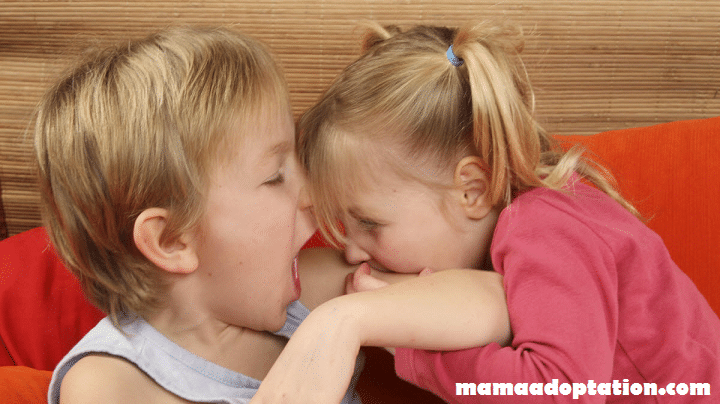My whole world collapsed when I heard that my baby was bitten at daycare. I couldn’t believe something like this could happen to my sweet little one.
- My child keeps getting bitten at daycare
- What to do if your child is bitten at daycare?
- The Bite: Describes the bite itself and what happened afterwards.
- Recovery: Talks about how you are feeling physically and emotionally after the bite.
- Tell your story of what happened at daycare and why you are writing about it.
- The Incident: Describe the event that caused your baby to be bitten
- Final Thoughts
I was worried about what would happen to her and how she was doing. Thankfully, she is doing well now, but it’s still hard to think about what could have happened if we hadn’t been there to protect her.
Always be vigilant when your child is in a new environment, especially if they’re not used to being away from you. Make sure you know who is caring for them, and ask any questions you have about their safety.
My child keeps getting bitten at daycare
A lot of parents worry about their children when they’re away from them, but few fret as much about what could happen to them when they’re in daycare. This is especially true for parents of kids who are prone to getting bitten. In fact, daycare can be a particularly risky place for kids to be bitten because there’s a higher concentration of people and animals around.
The good news is that most bites at daycare don’t result in any serious injuries. However, if your child is prone to getting bitten and he or she keeps getting bit at daycare, you may want to consider seeking out advice from a pediatrician or other professional who can help you identify the problem and find solutions.
How common is bitten at daycare?
At first glance, biting might seem like a rare occurrence in daycare. However, recent studies have revealed that biting is actually quite common among toddlers. In fact, one study found that about one-third of toddlers bite others at least once during the course of a year.
Why are toddlers prone to biting? Researchers aren’t sure exactly why this behaviour occurs, but they do know that it can be caused by a variety of factors. Some experts believe that kids who bite others are trying to assert their dominance over their peers or competitors. Other experts speculate that toddlers who bite others may be acting out because they’re feeling frustrated or angry.
Regardless of the reason, it’s important for parents and caregivers to be aware of the potential for biting in daycare settings.
What if your child bitten at daycare has broken skin?
Bitten at daycare can leave children with broken skin. If the child has broken skin, they should go to the doctor as soon as possible. There are a few things that you can do at home to help heal the wound.
First, make sure that the child is clean and dry. Apply a layer of ointment or cream to the wound and cover it with a bandage. Bring the bandage in to be changed every day or so. Second, make sure that the area around the bite is kept clean and dry. Wash your hands often and avoid touching the bitten area unless you are using a sanitizing product. Finally, encourage your child to tell you if there is any pain or swelling in the area where they were bitten.
What to do if your child is bitten at daycare?
If your child is bitten at daycare, there are several things you should do.
First, contact the daycare immediately to report the bite. Daycares often have procedures in place to deal with bites, and will want to know what happened so that they can take appropriate measures.
Second, if your child has a serious injury from the bite, seek medical attention.
Third, clean the wound with soap and water and apply an antibiotic ointment if available. Finally, keep the wound dry and covered until it heals.
Daycare biting laws and policy
Biting laws and policy vary by state, but in general, it is illegal to injure someone at a daycare facility. Some states have specific laws that address bites specifically. Other states require parents to report any biting incidents to the authorities. It is important to understand the law in your state before bringing a child into a daycare center.
How should daycare handle biting?
With more and more parents choosing to send their children to daycare, it is important for daycare providers to have a handle on how to deal with biting. While most bites are harmless, some can be serious enough to require medical attention. Here are some tips for how daycare providers should handle biting:
If the child has bitten someone in the past, take note of any known triggers and try to keep those things away from them. For example, if the child tends to bite when they’re angry or frustrated, make sure there are no toys around that could set them off. If the child is new to daycare and hasn’t bitten anyone yet, be positive that they won’t start biting people immediately and give them plenty of chances to get along with others.
If a bite does occur, take action immediately.
Can a child be removed from daycare for biting?
In the United States, it is legal for a child to be removed from daycare for biting. The age at which a child can be held responsible for their actions has changed over the years, but in most cases, a child cannot be held criminally liable until they are 8 years old. There are several factors that must come together before a child can be removed from daycare, including proving that the bite was done intentionally and with malicious intent. In most cases, it is up to the daycare to prove these facts beyond a reasonable doubt.
The Bite: Describes the bite itself and what happened afterwards.
The Bite: Describes the bite itself and what happened afterwards.
On May 3, 2016, a woman in Melbourne, Australia was bitten on the arm by a dog that had been sitting next to her. The attack left her with an 8-inch gash that required 10 stitches. What made this bite particularly alarming was that the dog had not shown any aggression beforehand; it simply bit down on the woman’s arm without warning.
The woman’s story illustrates just how dangerous unprovoked bites from dogs can be. Statistics show that unprovoked bites account for almost one third of all animal bite injuries in the United States, and they are responsible for more deaths than any other type of animal attack. Dogsbite because they are instinctively programmed to do so—they perceive humans as threats and react accordingly.
Recovery: Talks about how you are feeling physically and emotionally after the bite.
After being bit by a spider, people can experience a range of physical and emotional symptoms. Recovery from a spider bite can be difficult, but with the help of a healthcare professional, it can be done.
Tell your story of what happened at daycare and why you are writing about it.
Every day, parents drop their children off at daycare and go about their business. But for one mom, what happened at her child’s daycare was far from normal. This mother, who wishes to remain anonymous, alleges that her son was sexually assaulted by a staff member at the daycare. She says that she reported the assault to the authorities but is now afraid to leave her son alone at the daycare. The mother wants other parents to be aware of what she experienced so they can make informed decisions about whether or not to send their children to this type of daycare.
The Incident: Describe the event that caused your baby to be bitten
The events leading up to my baby bitten at daycare by another child are as follows. My two-year-old son was playing with his five-year-old sister and her two children in a park when the other child came up behind him and bit him on the back of the head. The bite left a large welt that started to form a bruise within minutes. I immediately took my son to the hospital where they treated the wound and discharged him. The incident has traumatized both my son and me, and we have been dealing with nightmares ever since.
Final Thoughts
I would like to remind parents to always be alert of their children and to take the time to ask about their day at daycare. If you are worried about your child, please do not hesitate to reach out for guidance. Finally, I want to stress the importance of getting your child vaccinated and stay up-to-date on safety precautions.
Read more…
Sending Baby to Daycare Once a Week (More Trouble Than It’s Worth)










